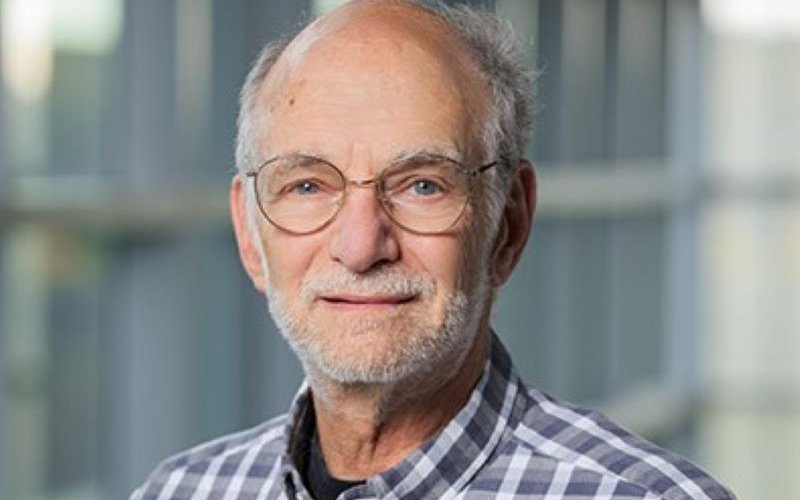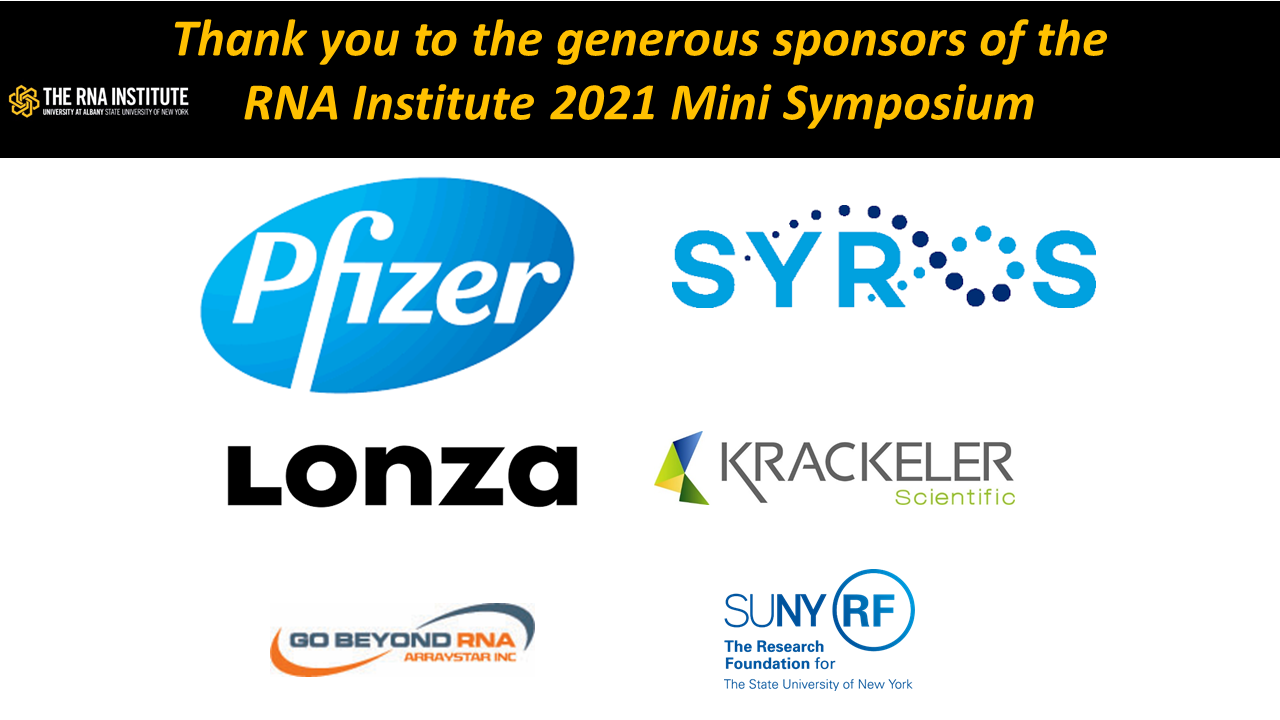The RNA Institute Mini Symposium, March 3-4, 2021

The RNA Institute will host a virtual symposium featuring Noble Laureate, Michael Rosbash, and presentations from Postdoctoral and Graduate Students. Wednesday, March 3 from 1:00-3:30pm and Thursday, March 4 from 10:00am - 3:30pm Eastern Time.
PROGRAM
Click Here to download PDF with Abstracts
Day 1: March 3rd, 1:00 pm - 3:40 pm EST
1:00 - 1:10 Welcome - Dr. Andrew Berglund, Director of the RNA Institute and Dr. Jeanette Altarriba, Dean, College of Arts & Sciences
1:00 - 2:00 Student Presentations I - Moderator Dr. Andrew Berglund
1:10 Shipra Malik, University of Connecticut. Nanoparticle delivered short anti-miR PNAs for lymphoma therapy.
1:20 Subodh Mishra, RNA Institute, University at Albany. A CTG repeat-selective screen of a natural product library reveals dietary natural compounds as potential therapeutics for Myotonic Dystrophy
1:30 Xavier Bofill De Ros, National Cancer Institute. Interplay between miRNA precursors and biogenesis enzymes promotes a widespread increase of aberrant isoforms in tumors
1:40 Sara Evke, SUNY Polytechnic, College of Nanoscale Science and Engineering. The Protective Role of the Epitranscriptome Against Acetaminophen Toxicity
1:50 Omer Ziv, Gurdon Institute of Cambridge. RNA-RNA Interactome of SARS-CoV-2.
2:00 - 3:00 Nobel Laureate and Distinguished Keynote Speaker - Introduction by Dr. Andrew Berglund
Dr. Michael Rosbash, Professor of Neuroscience at Brandeis University, Investigator at Howard Hughes Medical Institute
Title: "More than 50 years of RNA: Plus ça change..."
3:00 - 3:40 Student Presentations II - Moderator Dr. Marlene Belfort
3:00 Ya Ying Zheng, RNA Institute, University at Albany. Mapping and Functional Study of RNA Phosphorothioate Backbone
3:10 Esteban Orellana, Boston Children’s Hospital. METTL1-mediated m7G modification of Arg-TCT tRNA drives oncogenic transformation
3:20 Oguzhan Begik, Center for Genomic Regulation. Quantitative profiling of native RNA modifications and their dynamics using nanopore sequencing
3:30 Rachel Fay, Wasdworth Center, University at Albany. Evolution at increased temperature increases adaptability of flaviviruses
We had such a great group of abstract submissions that we have decided to hold an overflow day on March 4th to highlight more exciting RNA research!
Day 2: March 4th, 10:00 am - 3:30 pm EST
10:00 Welcome: Dr. Thomas Begley, Associate Director of the RNA Institute
10:05 - 10:55 Student Presentations I - Moderator Dr. Joseph Wade
10:05 Ali Ropri, RNA Institute/University at Albany. Cis-acting Super-enhancer lncRNAs as Diagnostic Markers of Progression to Early-Stage Breast Cancer
10:15 Sangeetha Selvam, RNA Institute/University at Albany. Direct Cell to Single Molecule: A versatile platform to analyze proteins in single-molecule TIRFM
10:25 James Thomas, Fred Hutchinson Cancer Research Center. RNA isoform screens uncover the essentiality and tumor-suppressor activity of ultraconserved poison exons
10:35 Rebecca D'Esposito, RNA Institute/University at Albany. Exploring the folding pathway of a RNA hairpin using IMS-MS and replica exchange molecular dynamics
10:45 Huachen Gan, Auburn University. Towards elucidation of the mechanism guiding pseudouridylation of Kaposi sarcoma-associated herpesvirus long non-coding PAN RNA
10:55 Short Talk from a Symposium Sponsor, Arraystar
Non-coding RNA and Epitranscriptomic Solutions - A free brochure from Arraystar you don’t want to miss
11:00 - 11:15 Coffee Break
11:15 - 11:30 Speed Talks I - Moderator Dr. Jia Sheng
11:15 Priyankaa Pitcheshwar, National University of Singapore. The role of ADARs-interacting RNA Helicases in shaping the RNA editome in cancer
11:18 Devadatta Gosavi, Auburn University. Insight into the secondary and tertiary structure of the Bovine viral diarrhea virus Internal Ribosome Entry Site
11:21 Carl Shotwell, RNA Institute/University of Florida. Disruption of RNA Modifications in Myotonic Dystrophy
11:24 Qiushuang Wu, Stowers Institute for Medical Research. Translation of small downstream ORFs enhances translation of canonical open reading frames
11:27 Ankana Naik, University at Albany. Role of LAG-3/MAML in Notch mediated transcriptional activation in C.elegans germline stem cell maintenance
11:30 Questions and Answers
11:50 - 12:15 Rigor and Reproducibility Round Table Discussion
Thomas Begley, Mindy Larsen, Cara Pager, Mehmet Yiget, Doug Conklin and Janice Pata
12:15 - 1:00 Lunch Break
1:00 - 1:35 Speed Talks II - Moderator Dr. Sweta Vangaveti
1:00 William Gasperi, The RNA Institute/University at Albany. Epitranscriptomic Writer Regulation of Gene Expression in Bacteria
1:03 Sarah Martin, Auburn University. The dynamic status of N6-methyladenosine modifications of polyadenylated nuclear (PAN) RNA lncRNA and its methylome throughout KSHV replication
1:06 Anaysa Bolin, Universidade de São Paulo. Glucocorticoid Modulate Oxidative and Thermogenic Function through Mitomir Epigenetic Signature
1:09 Tianhan Huang, Auburn University. Partial spontaneous intersubunit rotations in actively translating ribosomes
1:12 Jacob Schroader, The RNA Institute/University at Albany. Disease-associated inosine misincorporation hinders translation fidelity in vitro
1:15 Regan Hayward, Helmholtz Institute for RNA-based Infection Research (HIRI). Dualrnaseq: A transcriptome-based pipeline for the analysis of host pathogen RNA-seq data
1:18 Questions and Answers
1:35 - 2:00 Speed Talks III - Moderator Bijan Dey
1:35 Evan Davis, The RNA Institute/University at Albany. Elucidating Codon Preferences in Biological Pathways using Computational Methods
1:38 María Benitez-Guijarro, GENYO. Centre for Genomics and Oncological Research: Pfizer/ University of Granada/ Andalusian Regional Government (Granada, Spain) and The Rockefeller University (New York, US). Comparative study of the endogenous LINE-1 interactome: Zinc finger proteins as interactors of LINE-1 RNA/proteins
1:41 Miha Modic, The Francis Crick Institute and University of Cambridge. Relocation of LIN28A promotes embryogenesis by degrading the naïve pluripotency mRNA regulon
1:44 Preethi Seelam Prabhakar, University of Lethbridge. Post-transcriptional modifications at the 37th position in the anticodon stem loop of tRNA: Structural insights from MD simulations
1:47 Mehdi Pirouz, Boston Children's Hospital. The Perlman syndrome DIS3L2 exoribonuclease safeguards endoplasmic reticulum-targeted mRNA translation and calcium ion homeostasis
1:50 Questions and Answers
2:00 - 2:05 Coffee Break
2:05 - 2:45 Student Presentations II - Moderator Dr. Kaalak Reddy
2:05 Neha Nagpal, Boston Childrens Hospital, Harvard Medical School. Small molecule modulators of the long non-coding RNA component of telomerase, TERC, reverse molecular phenotypes of telomeropathies
2:15 Shawn Gianola, The RNA Institute/University at Albany. Modulation of ac4C RNA marks and Zika virus infection
2:25 Yekaterina Shulgina, Harvard University. A computational screen for alternative genetic codes in over 250,000 genomes
2:35 Joseph Ellis, RNA Institute/University of Florida. RBFOX and MBNL proteins coregulate splicing through a conserved buffering mechanism
2:45 - 3:20 Speed talks IV - Moderator Dr. Scott Tenenbaum
2:45 Zachary Mandell, Penn State University. NusG is an intrinsic transcription termination factor that stimulates motility and coordinates gene expression with NusA
2:48 Zhiming Yu, Hangzhou Normal University. RNA mimics GFP in Plant
2:51 Amber Altrieth, The RNA Institute/University at Albany. Endothelial Cell Contributions to Salivary Gland Injury and Recovery
2:51 Nimmy John, The RNA Institute/University at Albany. Influence of Environmental and Physiological conditions on the Notch Signaling Pathway
2:57 Roza Przanowska, University of Virginia. Functional characterization of MUNC lncRNA structural domains determined by SHAPE-MaP
3:00 Questions and Answers
3:20 - 3:30 Award Ceremony
Faculty & Staff Awards: Dr. Elga Wulfert, Professor of Psychology, Dean Emerita, College of Arts & Sciences
Student Awards: Dr. James Dias, Vice President of Research and
Day 1 - Each speaker will be awarded $150
Day 2 - The best talk in each session will be awarded $100



